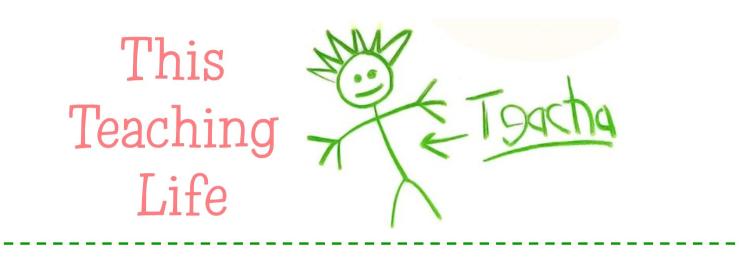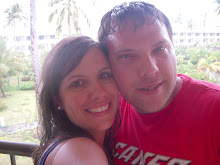I should be sleeping now but I'm wide awake mentally preparing for a meeting tomorrow to discuss whether or not M, my little guy should be retained next year. He missed an entire quarter of school due to his seizures and while he's making some progress since his return to school in February, his maturity level has regressed significantly and academically he is still somewhat behind. I have been tutoring him since mid-January and we've definitely seen progress but I am convinced his seizures have impacted his long term and short term memory negatively. M confuses basic sight words he previously had mastered, he'll ask me things like, "How do you write 14," and he struggles retelling stories he reads to show me what he is comprehending. I am anticipating my meeting tomorrow to be very emotional but I am looking forward to gathering a team of my colleagues as well as M's parents together to discuss what is best for him and his future. If you could, please send good thoughts our way tomorrow morning.
Tuesday, April 22, 2008
Monday, April 21, 2008
All I Need to Know I Learned in Kindergarten

Well... I thought I'd spice things up a bit and challenge myself a little more!! After teaching first grade for 5 years (although my first year was K-1) I have decided to leave the comforts of great team mates, a familiar curriculum, and a more desirable classroom to teach Kindergarten!!
Yikes!
I'm excited to take on something new next year and thrilled to be working with my friend, colleague, and mentor Ms. R. I am embracing the change and know that it really is the right time and the right move for me. All that being said I have to be honest and tell you all I'm scared out of my mind. There is a HUGE developmental difference in 1st graders and Kindergarten students and I am worried that I'm not fully aware of what teaching this age group will be like.
I guess I need to freshen up on a few of the finer things:
Share everything.
Play fair.
Don't hit people.
Put things back where you found them.
Clean up your own mess.
Don't take things that aren't yours.
Say you're sorry when you hurt somebody.
Wash your hands before you eat.
Flush.
Warm cookies and cold milk are good for you.
Live a balanced life- learn some and think some and draw and paint and sing and dance and play and work every day some.
Take a nap every afternoon.
When you go out into the real world, watch out for traffic, hold hands, and stick together.
Be aware of wonder.
Remember the little seed in the Styrofoam cup: The roots go down and the plant goes up and nobody really knows how or why, but we are all like that.
Goldfish and hamsters and white mice and even the little seed in the Styrofoam cup- they all die. So do we.
And then remember the Dick-and-Jane books and the first word you learned- the biggest word of all- LOOK.
All I really need to know about how to live and what to do and how to be I learned in Kindergarten.
~Robert Fulghum
Posted by
Blair
at
6:40 PM
7
comments
![]()
Tuesday, April 8, 2008
A Diagnosis
I am in love with the community of bloggers I have found through blogging about autism this month. I was linked to CC who posted an intriguing article found on NPR. The story is called "That Autism Thing" and this particular part of the chronicles focused on Gibbson's initial diagnosis.
Listening to Gibbson's parents' story took me back to a meeting I was apart of last spring. Liam, a 6 year old boy in my class last year, was what everyone called quirky. He was very particular about who he played with, what they played, and made sure everyone was willing to play by his rules. Liam was a very picky eater who would turn his back to everyone in the cafeteria and quit eating. When asked why he told me there were too many smells and "disgusting food" there for him to handle. Academically, Liam preferred to work alone and was above grade level in all areas. He brilliantly wrote screen plays on the Polynesian Wars and created story boards as he planned out his movies. I didn't think Liam was autistic, I just thought he needed to be taught in a different way to tap into his quirky personality and view of the world. I believed his personality made him who he was and didn't believe he was "on the spectrum." Nonetheless, we took him to student support team because we were extremely worried about the lack of nutrition he was receiving and how this may or may not have been causing outbursts at home. We (me, Liam's parents, the principal, school psych, and the SpEd teacher) noticed major patterns in Liam's behaviors once we all began to talk together and sure enough, felt it was best to refer him to the autism team in the county where I work.
The autism specialist came in and observed Liam in an academic setting, social setting, and asked me many questions. Turns out, yep, Liam fell somewhere along the spectrum. I felt guilty for not realizing this myself and then let my guilt go because I remembered that every child with autism is not the same, but unique to the disorder. The day we met to tell his parents what the autism specialist had discovered is a day that will stay with me forever. I am not a parent, but I do love my students like they are my own, and as I sat in the SpEd room listening to the specialist's report my heart was racing, my palms were sweaty, and my eyes were filling up with tears. I put myself in what I thought were Liam's parents' shoes for a moment and thought to myself, "Oh no! What are we going to do? How awful. Here is this little boy, only 6 years old, with this label. How will this impact him for the rest of his life?" Turns out, I was the only one feeling this way. Liam's parents, much like Gibbson's, were relieved because now they knew and could do something about it. They could join support groups and begin to understand their child for who he was. Embarrassingly, it was Liam's parents comforting me, not the other way around.
That day I learned that being diagnosed with something, having a label of whatever it might be, is not a stigma or a horrible thing, but rather a pathway to learning and understanding one another even more.
Posted by
Blair
at
5:06 PM
6
comments
![]()
Labels: Autism Awareness
Monday, April 7, 2008
Michael
Just the other day I was talking about April being Autism Awareness Month with my student teacher and we started talking about the children in my regular ed. class with autism. I told her how just 6 years ago when I was in college, no one even mentioned the word autism to me. I didn't know what "the spectrum" meant and my only experience with autism was watching Dustin Hoffman in Rainman. It wasn't until my first year teaching that I was blessed with having Michael in my class, a 6 year old blond hair, blue eyed, brilliant little boy. His mother came on "Meet the Teacher Day," and pulled me aside. She told me, her eyes filled with tears, that Michael had been diagnosed with a form of autism at the end of his Kindergarten year last year. I had no idea what this would mean for me, Michael, or the rest of the class. I had no experience or previous knowledge about what being autistic meant.
That year I learned:
my big open classroom shared by two other 1st grade teachers and their classes was not the right place for M
the phone ringing = a major tantrum
the trapezoid table with a long table cloth was a perfect place to hide
my name was not Ms.H but Blair because that is what it said on my name tag
my colleague smelled like maple syrup
to be careful how I worded things because saying "its raining cats and dogs" could be quite confusing
all the reasons/theories the Titantic sank
how to follow a schedule
I found myself getting so frustrated because how could Michael, the same little boy who could tell me why Bruce Ismay, Thomas Andrew, or Captin Lord were blammed for the Titantic sinking could not understand that it is not ok to yell in the middle of my lessons. I couldn't understand how someone so smart would hit another student instead of using his words to let them know he didn't want to read with a partner. I stayed on the phone with his mother for hours many days after school and finally reached a point of exhaustion. I had no idea what to do, how to teach Michael or the rest of the class, and I was angry that I did not have any training to handle this situation. To be honest I felt like, why is this child in my class? I'm not a special education teacher?!? As time went on however, I learned the most important thing of all from Michael... I learned how to differeintiate my instruction, how to meet ALL students' needs, and how to respect every child for who they are and where they are in their development.
This experience reminds me of Maya Angelou who once said, "When you know better, you do better." Each year I have had students with autism in my class. They all have different needs and what worked for me and Michael does not always work for me and the other children in my class with autism, but I have a better understanding and appreciation and most of all a stronger respect for children with autism and their families.
Posted by
Blair
at
10:34 AM
1 comments
![]()
Labels: Autism Awareness
Wednesday, April 2, 2008
Holy Smokes!
YIKES!!! After reading this article I worry about my little ones a bit more. I hate to think my students are growing up in a world where 3rd graders could even be thinking this way. I wish it was only an April Fool's joke but this was no laughing matter!
Posted by
Blair
at
7:18 AM
4
comments
![]()


